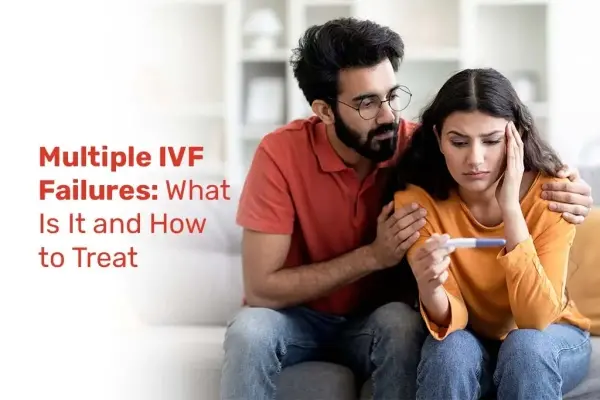What Is IVF Failure?
IVF is a safer and more successful technique for those unable to conceive for several reasons, but some consequences can lead to IVF failures. In multiple IVF failures, there are three or more failed attempts. Multiple IVF failures involve those who fail to become pregnant and whose early pregnancy ends in miscarriage.
The reasons for IVF failure are chromosomal abnormalities, poor embryo or egg quality, the mother’s age, abnormal sperm, uterine issues, and paternal and maternal health. Multiple IVF failure treatments may involve preimplantation testing, donor egg solution, and gestational surrogacy.
What Are the Causes of Multiple IVF Failures?
- Egg abnormality may cause failure because the human egg is a complex structure, and chromosomes may have an abnormal distribution due to spindle apparatus breakage. This may cause damage to the oocyte.
- Abnormal sperm morphology.
- The embryo may be unable to attach properly, or the uterine lining is incompatible.
- High maternal age or any medical condition like high blood pressure, diabetes
- Uterine problems such as adenomyosis may cause IVF failure.
- An unhealthy lifestyle and low-quality embryos
- Primary ovarian insufficiency, also called early menopause, can also cause this. Primary ovarian insufficiency refers to a loss of normal function of the ovaries before age 40. The ovaries don’t produce normal amounts of estrogen or release eggs regularly.
- Presence of uterine polyps
- A premature increase in progesterone levels
- Thin endometrial lining or tuberculosis of the uterus
- Hydrosalpinx (collection of the fluid in the fallopian tube) may lead to infection in the endometrium or cause drainage of this fluid in the uterine cavity flushing the embryo out.
What Are Multiple IVF Failure Treatments?
- Doctors may advise a few tests after an IVF fails.
- Preimplantation genetic testing can be done. Screening of embryos for chromosomal abnormalities before implantation leads to a higher IVF success rate.
- Sperm DNA and immunological tests are done.
- Donor eggs are another path to a successful outcome for those who have age or quality of eggs issues.
- Gestational surrogacy is a good option for those who have multiple fibroids or thin endometrium leading to recurrent implantation failure. The doctor transfers the viable embryo into the uterus of a gestational surrogate.
- Endometrial polypectomy is needed if multiple IVF failures are due to uterine polyps. It’s a surgical procedure done under local anaesthesia. It can be performed in an outpatient clinic.
- Salpingostomy to remove hydrosalpinx (fluid-filled, blocked fallopian tube) is necessary to go for a successful IVF implantation.
Conclusion
In-vitro fertilisation is suitable for couples who need help achieving pregnancy. Multiple IVF failures are stressful and painful, so it becomes very important for doctors to know the exact cause of the failure and take further steps accordingly. Knowing what is IVF failure and what the causes are, then the IVF procedure may become successful by following up the treatment procedures. IVF may add satisfying happiness to couples, so putting your faith in a qualified doctor and his actions are appreciated.

